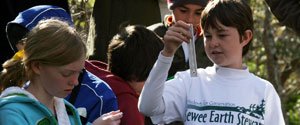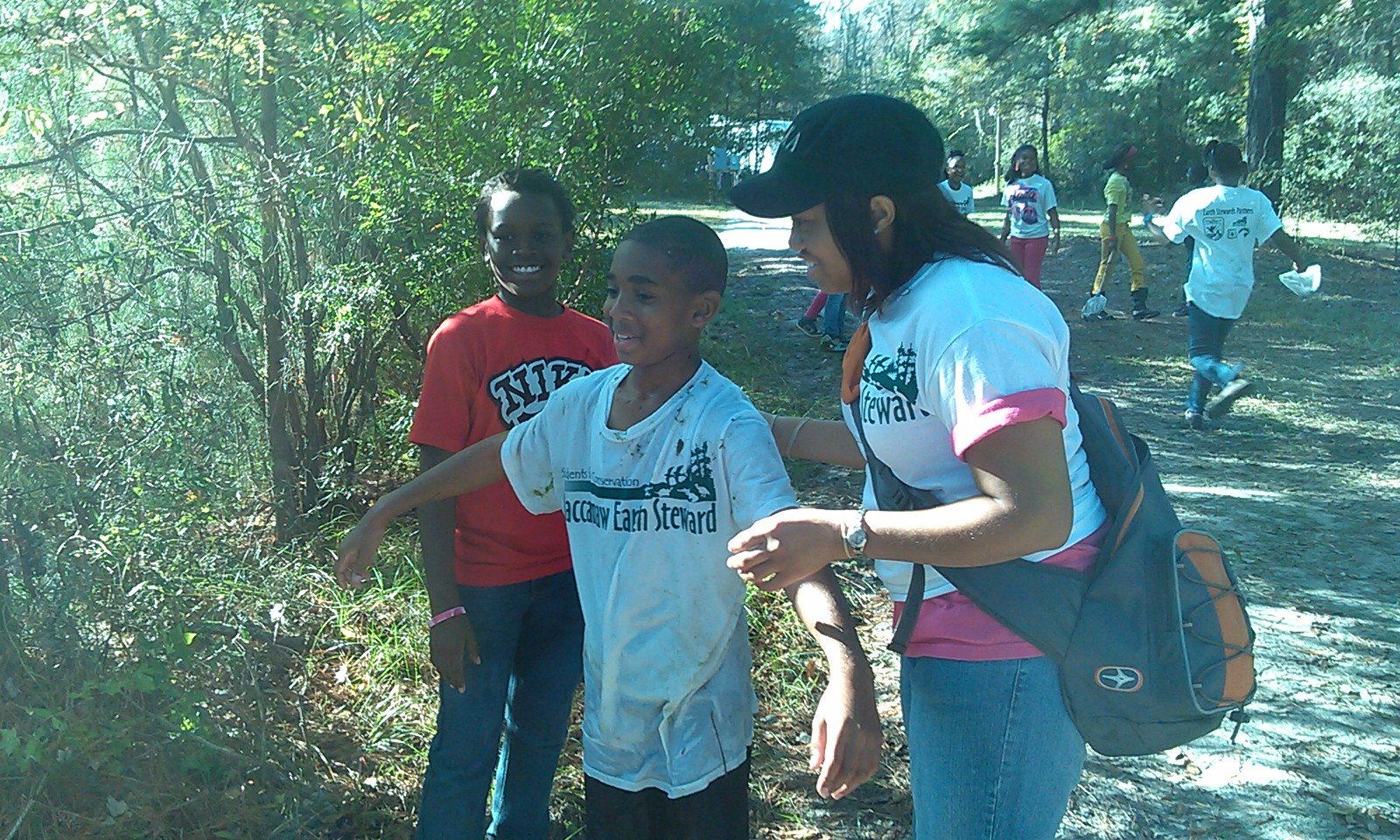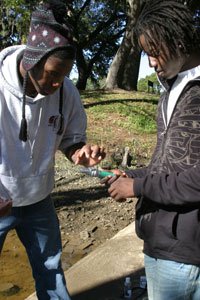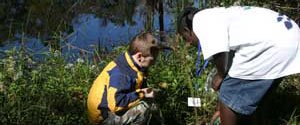EDUCATION
-
The SEWEE Association reached over 14,000 people during Environmental Education programs in 2011! Check out our latest project: Water monitoring in Georgetown County
ATTENTION TEACHERS
-
See what happened when Montessori Fountainhead Elementary School's visited the Sewee Center!
We offer many lessons at the Sewee Visitor & Environmental Education Center in Awendaw and the Waccamaw Environmental Education Center in Georgetown on Freshwater Wetlands, Forests, Ecosystems, Endangered Species, Salt Marsh Ecology and animals found within the Coastal Plain of South Carolina. These lessons are designed for the one-day visit and are available for grades K-12.
For more information on classes that are available, click here for a listing of programs for Sewee or programs at Waccamaw. If you want to book a program at the Sewee Center, you can email the SEWEE Association Educator. For programs at the Waccamaw EE Center, please contact our Waccamaw Educator and we will be glad to work with you there.
-
OUR EARTH STEWARD SCHOOLS
-
Since 1999 we have partnered with local schools in the Sewee Earth Stewards program. This is a multi-week program focused on freshwater wetlands, designed using the curriculum standards. Our staff works with teachers to present lessons and activities in the classroom and field studies in the Forest or on our Refuges. Students participate in hands-on, interactive classes and learn first-hand the purposes of this ecosystem.
During the 2012-2013 school year, 13 schools from Charleston, Berkeley, and Georgetown Counties will participate with nearly 800 students and teachers in this program.
This year we held a No Waste Lunch Contest with all the Earth Stewards Schools. Every time they came on a field trip, we weighed their trash. The goal was to create less trash going to landfills. We encouraged reusable containers to even reduce the amount of trash that needed to be recycled. Space on our earth is non-renewable and trash in the environment can harm wildlife. If we use reusable containers, we can save these valuable resources! All of the schools made great strides to reduce the amount of trash they produced. Keep reading to find out who the winners were and hear what else the Earth Stewards were up to this year!
-
Belle Hall Elementary -- These students have sold over 1,500 Loggerhead Sea Turtle grocery bags to their classmates to reduce the amount of plastic bags that are used! See them in the video above. They also won the "No-Waste Lunch" award for 2012. On their last trip, they had less than a 1-quart bag of waste for 60 students!
-

-
Minnie Hughes Elementary
Our 5th graders just spent 2 weeks with us and have a greater appreciation of the ACE Basin National Wildlife Refuge. They were so excited to learn about the 3 rivers (Ashepoo, Combahee, and Edisto) that form the ACE Basin. But they were most excited to see and learn about our turtles, snake and alligator. In their letters of thanks, they talked about how awesome it was to see these animals up close and learn about them. They also talked about "our ACE Basin", so we hope they know about true stewardship of where they live.
Plantersville Elementary

What happens when you are having a great lesson about macroinvertibrates and a vertibrate (muskrat) decides it wants to eat your dip net? This student found out at Cox Ferry Lake RA of Waccamaw NWR this year when he was pulled into the pond and came out soaked! Thank goodness it was a warm October day!!
St. James-Santee Elementary -- This school is our longest participating Earth Stewards school --- they have been with us since the beginning in 1999!! Many of our early students are now in high school, college, and beyond. We can't wait to work with this year's students beginning in January, 2013!!
Stono Park Elementary -- The Sewee Center reptiles visited our students and now the students will come to the Sewee Center and I'on Swamp to see where all these reptiles live in the wild!
Sullivans Island Elementary -- These 5th graders will explore Ion Swamp this fall and learn how different the habitat is compared to their barrier island!
Zucker Middle School of Science -- Olga Caballero, Archaeologist for the US Forest Service, joined Zucker Middle School Earth Stewards at the Sewee Shell Ring to show artifacts and tell stories about the Sewee Indians that called this area home thousands of years ago.
Boulder Bluff Elementary -- Boulder Bluff Earth Stewards braved the rain in April to go on their Ion Swamp Field Study!
Browns Ferry Elementary -- These Earth Stewards visited Huntington Beach State Park this spring. They observed plants that grow close to saltwater compared to the freshwater species we studied this fall along the PeeDee River at Waccamaw National Wildlife Refuge.
Cape Romain Environmental Education Charter School -- We are so excited to welcome the fifth-graders of this new charter school into our Sewee Earth Stewards program. They will be investigating Francis Marion National Forest and Cape Romain NWR beginning in January, 2013.
Carvers Bay Middle -- Students from Carvers Bay experienced what it is like to be a biologist studying the endangered Red-cockaded Woodpecker that inhabits Sandy Island.
Lincoln Middle/High -- These 7th graders helped out our local pollinators by planting native wildflowers in front of the Sewee Center. Come check out the garden!
McDonald Elementary -- As part of their Earth Stewards program, these 5th graders increased recycling in their cafeteria and educated the entire school how to do this and why it is important! They also won our "Most Improved School" in the No Waste Lunch Contest.
-
H2O Monitoring Project in Georgetown County
-

Teondre Bromell and Damion Franklin check salinity levels in the Great Pee Dee River at Samworth WMA.
The SEWEE Association has begun a new project in collaboration with Service over Self and the Waccamaw Riverkeeper to engage local middle and high school students. These students will perform water monitoring tests on the Great Pee Dee and Sampit Rivers monthly. They are doing classic monitoring for Dissolved Oxygen, pH levels and turbidity, and we have added salinity testing. There is an interest in how the rising sea levels are impacting our freshwater rivers, so these tests will give us information about the amount of salt water pushing up these rivers each month.
-

-
Check out our gallery to see what the students are up to!